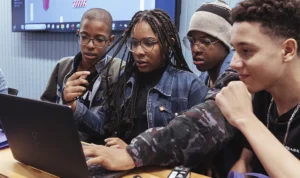Brazil is advancing in the qualification of professionals to work with technology and combat the risk of a technological blackout, points out the Global Skills Report 2022, research carried out by Coursera with over 100 million people using the platform to learn new skills in technology, business or data science.
This study shows that the percentage of Brazilians who said they were proficient in skills in the digital world jumped from 48% to 72% between the 2021 and 2022 reports. The technology sector is where Brazil is best ranked in the survey: it ranks 29thO place among 102 countries, rising 24 positions in relation to the previous survey.
As a result, the country is considered competitive in terms of qualifying professionals to work in this market, which means being in the same group of countries as Korea, Spain and Israel. In the general ranking (including learning in business and data science), Brazil is in 53O place and rose 17 positions compared to the 2021 report.
“It’s positive news, which shows Brazilians’ interest in training. The report confirms a path in which iFood has been investing, which is training and training in technology, especially for people with underrepresented profiles in the area”, comments Luanna Luna, education manager at iFood. “There is no way to combat the technological blackout, nor is it possible for Brazil to become a more prosperous country without investing in technology training.”
According to Coursera, the areas in which Brazilian men and women most demonstrate proficiency in technology are:
- Cloud Computing (99%)
- Web development (78%)
- Software Engineering (64%)
- Computer Networks (63%)
- Database (55%)
- Mobile development (48%)
Technology against climate change
In 2021, more than 4.1 million Brazilians used Coursera to learn about technology, business and data science. These people are, on average, 33 years old; 47% are women and 47% take classes on mobile devices. It's a similar profile to Latin America: 50% are women, the average age is 32 years old and 47% take the course on cell phones or tablets.
According to the report, investing in technology is a way for Brazil, a major exporter of agricultural products, to diversify its economy and reduce the damage that global warming can bring to the sector (such as reduce Gross Domestic Product between 0.4% and 1.8% by the end of this century).
“As the Brazilian economy faces headwinds from inflation, drought, and supply chain disruptions, technological innovation has the potential to spread prosperity if Brazilian companies can adapt,” the document points out.
Are you interested in the subject? Also find out how technology can boost business


